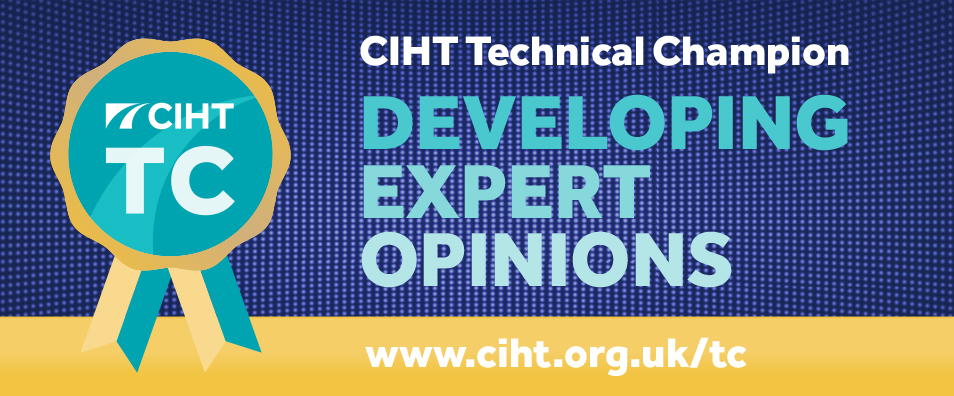

CIHT spoke with one of our CIHT Technical Champions Dr Elizabeth Box about how technology can help make our roads safer and what measures are needed to ensure drivers use new technologies in a safe way.
Join other savvy professionals just like you at CIHT. We are committed to fulfilling your professional development needs throughout your career
With over 20 years of experience, Dr Elizabeth Box, CIHT Technical Champion, is a prominent transport researcher and commissioner. She holds a PhD in Transport Psychology, is the Research Director for the RAC Foundation and consults for Co-Pilot, a start-up in road safety education.
>>> Do you want to become a CIHT Technical Champion? Click here to find out more
Dr Elizabeth Box was also the lead submitter for the project ‘Pre-Driver Theatre and Workshop Education Research’ which was Highly Commended in the 2022 CIHT Road Safety Award.
>>> CIHT members can read the Dr Elizabeth Box’s award submission here


We are on the verge of a transformation in vehicle technology which is going to be a really interesting transition to witness.
Thinking about the vehicle itself, the use of advanced driver assistance systems (ADAS) such as automatic emergency braking, which supports drivers with the driving task, is where the greatest immediate benefits will to be seen. This kind of in-vehicle technology will continue to expand and will help to reduce human error. Thinking beyond the vehicle itself, vehicle to vehicle and vehicle to infrastructure technologies will also increasingly support a safer road system.
However, the increased use of technology within the road system is not without its risks, such as the potential issues that might arise from an over-reliance on technology. Striking a balance between these benefits and risks will be crucial for maximising the contribution of technology to road safety.
The advent of fully autonomous vehicles promises to change driving as we know it. Full automation has the potential to remove human error from the system, but there will be a protracted transition period in the development of automated vehicles, where users will need to be ready to take over control from partially autonomous vehicles in the near term.
The RAC Foundation commissioned some research with Nottingham University looking at how drivers respond in level three automated vehicles when they are required to take back control, using a high-fidelity driving simulator to observe their behaviour. Once the vehicle was in automated driving mode on the motorway, participants were free to look at their phone or read a book and were then notified by the vehicle to take back control and transition from automated driving. Whilst initial driving performance after the transfer of control was poor, driving performance at handover improved with experience.
A follow-up study looked a whether it was possible to train drivers to take over control. The study included two groups of experienced drivers, one trained by a behavioural training checklist known as ‘CHAT’ (Check, Assess and Takeover) and the other trained by reading an operating manual. The groups were then placed in a high-fidelity driving simulator to observe their behaviour. The group who were trained with the operating manual took almost 10 times longer to pay full attention to driving, continuing to glance at their phone or book for an average of 11.2 seconds, compared with 1.8 seconds in the CHAT behavioural group. This research collectively helps to illustrate the importance of designing systems based on human capabilities and of the need to properly train people to use autonomous vehicles.
There are actions that transport professionals can take to help drivers take account of and adjust to new technology. We should start thinking about the implications new vehicle technology has for the driving test. At what point will changes need to be brought in over the next ten years? If past experience tells us anything, we need to start planning for such changes as early as we can. It has been suggested that you could have a specific license for self-driving cars, like how we currently differentiate licenses for manual and automatic cars.
Another, potentially better, option would be to include testing for new technologies as a development and extension of the existing driving licensure system.
We know that a lot of learner drivers tend to be younger and use their instructors’ cars, which are typically up-to date with some of the latest technologies. So naturally, as new technologies come onto the market, many of these drivers will be experiencing them as they learn to drive in any case. However, clearly we are going to get to a point where there will be a fundamental shift in the requirements associated with ‘being in charge of’ rather than ‘driving’ a vehicle.
We will also need to think about those who already have their license and have been driving for a while. How can we make best use of the ‘point of sale’ when people are purchasing a new vehicle? It’s vitally important that as new technology becomes more readily available that drivers feel confident about using the technology, otherwise there is a risk that people will turn it off if they do not understand it or have a bad experience, which will negate the available safety benefits.
As newer vehicle technologies come online, in the event of a collision, it becomes vitally important that we have the capability to understand the multiple causal factors in any collision involving automated vehicles. Investigations need to not only look at fault, from a legal criminal culpability perspective, but also take a systems approach to extracting all important safety learning from collisions, which goes beyond simply focusing on the driver and the immediate circumstances of a collision.
Between 2018 and 2022 the RAC Foundation managed the DfT and National Highways funded Road Collision Investigation Project, which culminated in the UK government committing to setting up a Road Safety Investigation Branch. Going forward, it's vitally important that the Road Safety Investigation Branch is endowed with the powers needed to access data to investigate collisions – be they of automated or conventional vehicles.
Aside from collision investigation, there’s also an important issue related to public trust and the use of vehicle data. It’s vital that the transport sector has the right processes and regulations in place to support data sharing for new transport technologies in a way that benefits our understanding of the transport system and is acceptable to members of the travelling public.
If you look across history, it often takes a while for the public to reorientate themselves to new technologies. If new technology is easy and attractive to use, it is generally much easier for people to integrate into their lives.
The Behavioral Insights team produced the EAST Framework in 2014, which concluded that effective and efficient policy should be ‘Easy, Attractive, Social and Timely’. The sector would be wise to consider this framework when introducing new technologies and considering how to encourage public support for their roll out.
Dr Elizabeth Box is a CIHT Technical Champion and was in conversation with Isobel Wilson, CIHT Policy Advisor – Transport Technology.
To protect lives and reduce accidents Road Safety education from a very young age is fundamental. All road users should be aware of their surroundings and make sure their behaviour enables all forms of travel to safely take place.
While improving road safety comes from a wide range of measures, including road design, setting the correct speed limits and immediately responding to accidents, raising awareness of the rules and risks can reduce dangerous behaviours and protect those who are most vulnerable.
In this webinar we will be looking at the different ways in which Road Safety education can take form: from school- based programs to public awareness campaign and drivers’ education. We will focus particularly on the protection of vulnerable road users and hear positive examples of successful behavioural change initiatives.
For any press enquires please contact communications@ciht.org.uk
For any technical enquiries please contact technical@ciht.org.uk
Join other savvy professionals just like you at CIHT. We are committed to fulfilling your professional development needs throughout your career
{{item.AuthorName}} {{item.AuthorName}} says on {{item.DateFormattedString}}: